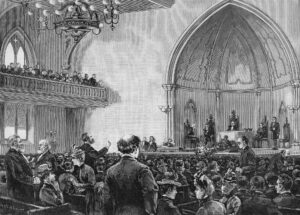“the structure of the world, and the most beautiful arrangement of the elements, ought to have induced man to glorify God, yet no one discharged his proper duty… .”
– Calvin
The concept of “nature,” of “the way things are in themselves, or are directed in themselves to behave,” is an old one, going back in the Western discourse to the ancient Greek philosophers, though in human languages much farther still. A good case can be made that it is in fact perennial, an idea that all humans have, and which is ultimately unavoidable for reflective people.
That being said, the concept has also been controversial. In Reformed theology from the 20th century, under the influence of writers like Karl Barth but also Cornelius Van Til, the idea of a natural order that, upon reflection, requires certain true beliefs and certain right practices has been strongly challenged. In the broader Western culture also, many challenges have been raised to the validity of a concept of “nature,” or at least one that would be relevant to the work of practical reasoning. From at least the time of David Hume, in fact, some ethicists have challenged the possibility of reasoning from “the way things are” to “the way things should be” as a “naturalistic fallacy.” And indeed, there are fallacious paths from the one to the other, but not all such paths fall into such pits.
Yet reason, scripture, and the mainstream of Reformed theology alongside its strong advocacy for its doctrine of sola scriptura support one kind of reasoning from “is” to “ought.” And in doing so, the Reformed tradition provides helpful mentoring in the task of thinking through how to please the Lord today.
Nature, Scripture, and Reformed Theology
Scripture supports this concept in numerous ways. Many passages refer to an objective goodness in the world, especially one that can be discerned by people through the goal-directed structure of the world (or parts thereof) itself, and not only through special revelation. But some are more direct and clear than others. One such passage is Romans 1:32. In the course of explaining why God’s anger is directed toward the injustices perpetuated by humanity in general (as a lead up to explaining how the Gospel of Jesus Christ is good news for the same people), Paul concludes by saying (vv. 28-32):
And since they did not see fit to acknowledge God, God gave them up to a debased mind to do what ought not to be done. They were filled with all manner of unrighteousness, evil, covetousness, malice. They are full of envy, murder, strife, deceit, maliciousness. They are gossips, slanderers, haters of God, insolent, haughty, boastful, inventors of evil, disobedient to parents, foolish, faithless, heartless, ruthless. Though they know God’s righteous decree that those who practice such things deserve to die, they not only do them but give approval to those who practice them.
The phrase translated here “God’s righteous decree” refers to something known by humanity in general, not just the Jewish people who received the oracles of God from Moses and the Old Testament prophets. And it is a decree that directs people away from certain ways of acting, and by implication, towards the opposite of these attitudes and behaviours.
This is one way of describing the basic concept of natural law as an ethical principle. As a movement devoted to returning to the scriptures to check customary doctrines, magisterial Reformed thinkers found this idea in scripture and promoted it in their teaching. The quote from John Calvin at the outset of this post is just one small example of this kind of reasoning in the course of biblical commentary. But commentary is far from the only place in which nature was mentioned. Martin Luther—who is sometimes caricatured as simply against “reason”—would at times use a kind of natural law reasoning to instruct Christians. For example, in a treatise on obedience to political authorities, he wrote:
For when you judge according to love, you will easily decide and adjust matters without any law-books. But when you ignore love and natural law, you will never succeed in pleasing God, though you have devoured all the law-books and jurists; they will only cause you to err, the more you depend on them. A good and just decision must not and cannot be given out of books, but must come from a free mind, as though there were not a single book. Such a free decision, however, is given by love and by the law of nature, of which the reason is full; but out of the books come rigid and vague judgments.
Passages such as this (though without Luther’s exaggerations) could be multiplied for all the major magisterial Reformed writers and figures, and similarly so for the subsequent Reformed orthodox periods, as well as later Anglo-American and Continental Reformed traditions, not to mention the Lutheran one.
Nature and “Scripture Alone”
But granting that the magisterial Protestant traditions affirmed the utility of nature for ethical reasoning, how can they avoid the charge that this contradicts one of their central doctrines, “scripture alone”? For it seems that nature is an addition to scripture, making the latter no longer “alone.”
A careful examination of what the Reformed tradition meant by “scripture alone” resolves this problem, however. One carefully articulated statement about scripture, found in the Westminster Confession of Faith (I.I), makes this clear:
Although the light of nature, and the works of creation and providence, do so far manifest the goodness, wisdom, and power of God, as to leave men inexcusable; yet are they not sufficient to give that knowledge of God, and of his will, which is necessary unto salvation; therefore it pleased the Lord, at sundry times, and in divers manners, to reveal himself, and to declare that his will unto his Church; and afterwards, for the better preserving and propagating of the truth, and for the more sure establishment and comfort of the Church against the corruption of the flesh, and the malice of Satan and of the world, to commit the same wholly unto writing; which maketh the holy Scripture to be most necessary; those former ways of God’s revealing his will unto his people being now ceased.
Scripture alone contains what is necessary and sufficient to be known for salvation, but it is not alone in teaching what human beings are obligated to do in response to God’s activity in creation.
The Use of Nature
What might this truth do for us, if we accept it? First, it can provide us direction on how to please the Lord, since nature is simply his work created for the manifestation of his excellence, and therefore aims us toward that same end when we act in accord with it.
Second, since it is a reality in principle knowable and in fact known to some degree by everyone, it provides a potential bridge to persuading people (by the grace of God) towards love for their Creator and the flourishing it produces.
And third, since scripture presupposes and explicitly appeals to this reality, it can help Christians understand the meaning and purpose of scripture itself, which includes glorifying God with our good living.
There are many issues raised in the present-day context about this idea, both in Christian circles and outside of them. For those interested in a more extended though still fairly brief discussion of these issues, one place readers can consult is Natural Law: A Brief Introduction and Biblical Defense.




















